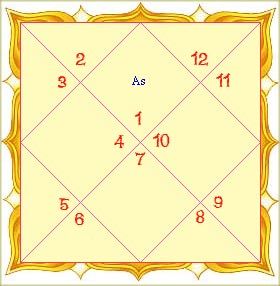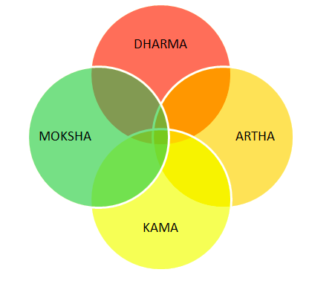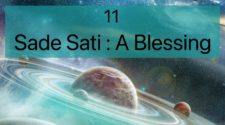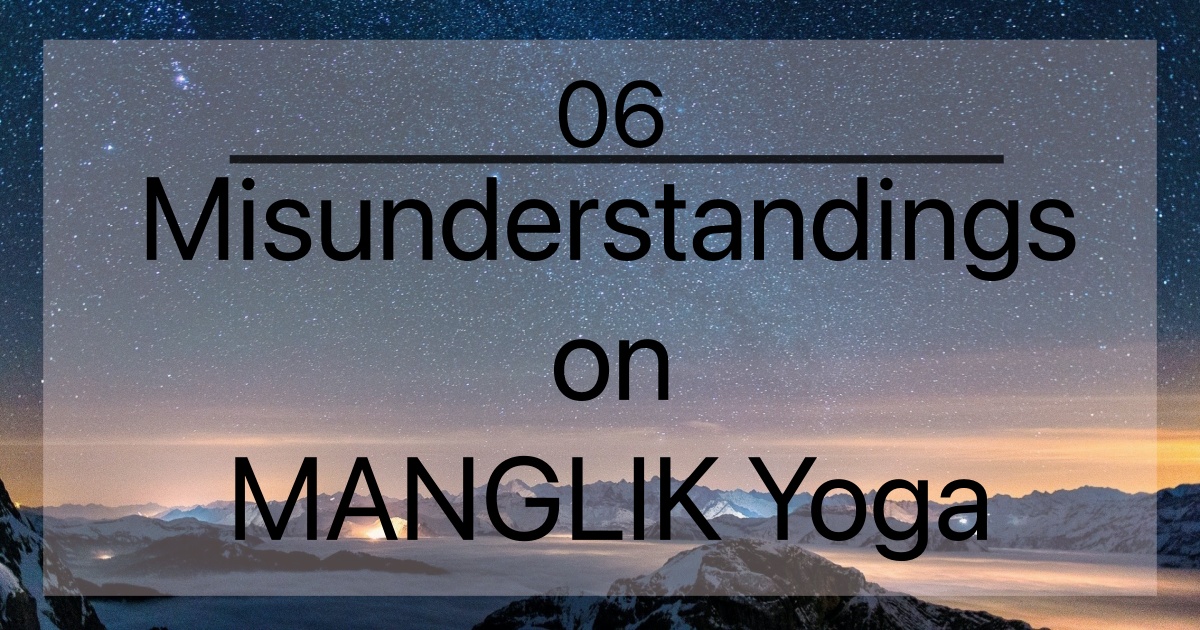I am assuming most of you would have heard this term at least once. Also, pretty certain that a vast majority of you, are confused about it’s exact meaning. This (in)famous yog comes a lot during the marriage consultations and has been blamed a lot in almost 95% of cases as a marriage breaker. But has even anyone wondered why Mangal Dosh breaks marriage ? The term Mangal is a positive word, it doesn’t have that ominous ring to it. Right ?
Mangal in Jyotish points to the planet Mars and it also means auspicious. While dosh is usually understood as defect, problem, issue or evil. In reality, Dosh doesn’t mean anything in the vein of evilness. Dosh simply means imbalance. Thus the ‘Mangal Dosh’ literally means ‘Auspicious Imbalance’ and nothing else. All the fear mongering built around it, was intended to play with the innocent and make gains through it. However, over time, this has spun out of control, despite some sincere efforts from well meaning people. Earlier, the Jyotishi used to misuse it, however now even the common junta misuses it.
Lets get a bit deeper towards understanding this Auspicious Imbalance (Warning: Things Might get a bit technical)
In a Kundali/Patri/Chart, we have the following basic aspects:
- there are 12 houses (Bhav)
- each house contains 1 zodiac sign —ie. in all 12 signs
- 9 planets occupy this 12 signs (Vedic Jyotish doesn’t include Uranus, Neptune, Pluto)
- each house/Bhav represents certain aspect of life
- 1st -self ; 2nd-family; 3rd -effort; 4th- home/mother; 5th-education/children; 6th-health, enemy; 7th -Partner; 8th -occult; 9th -Father/religion; 10th-profession; 11th-Gains; 12th-Loss/bed pleasures
More will be shared as we progress ( for now dropping the why and how of 12 signs, etc)
A chart in simple terms is the snapshot (a screen grab) of the sky at the moment of child’s birth. Depending on that moment and their position, the planets in get casted in the signs. This leads to formation of various yogs. It may so happen that one or more planets are in same sign (as in sky—as above so below). One such yog is Mangal Dosh.
Definition:
If Mars/Mangal occupies 1st 4th 7th 8th or 12th house then it qualifies as Mangal Dosh.
(also a mild version of this Dosh occurs when Mars in 2nd or 5th too— more on this later )
This in prevalent system of (mis)understanding is considered as causing havoc to those respective spheres of life namely : 1> self, 4>home, 7>marital discord, 8>death, 12>bedding issues. This is a very simplistic and very cheap delineation the said rule.
When a worried ‘customer’ hears this from the Jyotishi it scares him. Fear is that emotion which enables the Jyotishi to milk lots of money from his customer. The Jyotishi knows that the customer is already in some form of trouble, otherwise why would he or she be sitting in front of a Jyotishi. The customer is meek and will never question the jyotishi (–> this is the first pitfall )
The 12 houses are called as Bhav —which means expression.
These 12 expressions are broadly 12 spheres of life. Each Bhav has multiple layers and indicates more than just one aspect of that sphere. Subtle connections are present at various levels which require effort to grasp. For eg: 6th Bhav indicates service, shows your enemies, shows your health etc.. a cursory look may show there is nothing common in those but they all are related. Enemies are not always external , illness, diseases are primary enemies. One needs to be fit (healthy) to be of service. This is just one layer in understanding this Bhav. This understanding is to be furthered through the concept of Dharm, Arth, Kaam and Moksh (Leaving Satvik, Rajasik, Tamsik aside for now)
Now back to Mangal dosh , which generally has to do with the martian energy imbalance. Mars is the warrior, the commander in chief of armies, responsible for the ‘energy’ that a human posses. If it is in the, 1st Bhav > it indicates a highly energetic person (physically), 4th Bhav > its like solider, who isarmed to teeth is given, but is given the task to decorate the house and to get into homely mode 7th Bhav > it is like a celibate solider being forced into marriage 8th> a dedicated solider, is given free hand to kill 12th Bhav > a soldier obsessed with war strategy, is forced to play bed games.
These are just a few interpretations based on the position of the Mars in those Bhav. As there are rules for Mangal dosh, there are also for its cancellation too. Rather there are more rules for cancellation. I am avoiding detailing them here as it all gets technical, it requires a much wide explanation, maybe later we can delve deep into them.
How a single planet, with its position can create multiple probabilities of outcomes. To this add a another rule—> these positions of Mars have slight different results for women and men. Which is why we see myriad of opinions as there is huge leeway, scope or wriggle room left for the astrologer to use for his own benefit.
Lets take another perspective at this from pure mathematical probability.
Out of 12 houses if Mars occupies 5 houses we say it is Manglik, then simple maths and we an approximate 42 % chance for a person to being Manglik
Now if we consider the extended rule of 7 houses for Mangalik, then an approximate 60% chance is present for a person to be Manglik.
That will make 60% of world non marriageable for the non Mangliks, or at least marriages would have dissolved right and left. But this is counter to our real world observations!
Mars alone cannot cause that much of a damage. In Jyotish one planet is never considered in isolation. The Manglik dosh cancellation rules highlight, as how other planets reduce Mars effect. Thus. just only because Mars is present in one of those 5 houses, it doesn’t make a person Manglik.
Also the effects of this dosh as stated in the classics cannot be assumed to match the current day, after all one basic rule for a Jyotishi to follow is the Desh Kaal and Paristhithi (DKP) principle. Mars is quite important for love marriages, but what we call the love marriage in India is not the same in western countries, that’s why keeping the DKP principle in mind is a must.
Let’s say, despite, all these escape rules, still one person turns out to be a Manglik, then will that person suffer all their life ? The answer is absolute resolute NO. All planets have their ‘maturing’ ages, in the case of Mars its 28.
What this means is that the planet ‘exerts’ itself strongly once the native reaches that age. Explaining this is bit hard, but one can draw comparison to a flower blooming or a fruit getting ripe. This happens at precise moments, similarly planets mature at precise moments. Mars exerts itself from 28 to 32, after that it mellows down. Like with increasing age a person’s energy starts to decrease, the person starts preferring using more of the brain (as in patience), over physical strength.
Broadly speaking, the issue of Manglik gets subdued by 32 and latest by 35.
Again remember this true only when, after applying all the cancellation rules, Mangal is still causing the dosh. Such occurrences are very rare.
All in all, the clear concludes is never take such an infamous yog at its face value.
Also one must see that there were rules and their effects were set in period when life expectancy was 40ish, job options were limited, and a large part of populace was engaged as soldiers. The impact of Manglik dosh was naturally limited to the those times (as per DKP) when it was created. Today we need to adapt such concepts to the current century.
In the case of Manglik, a single yog we considered, we can see how much thought is required for its application. All this, without touching the aspect of the Nakshatras, and how they play in this context.
With Nakshatras, each step gets even finer,
Planet in Bhav > Rashi > Nakshatra > Nakshtra pada > certain Degree = to result.
 Again each of the above steps will have their own iterations of Dharm -Arth-Kaam-Moksh, elemental nature like Fire, Water, Earth and Air. The finer you get the tougher the analysis. The Fiery Grah Mars in a Water sign like Cancer has a very tough time, as water douses Fire. While the same Fiery Mars in Airy Gemini is happy, as air promotes fire. This way, one can keep refining the results to resolve the karm they indicate.
Again each of the above steps will have their own iterations of Dharm -Arth-Kaam-Moksh, elemental nature like Fire, Water, Earth and Air. The finer you get the tougher the analysis. The Fiery Grah Mars in a Water sign like Cancer has a very tough time, as water douses Fire. While the same Fiery Mars in Airy Gemini is happy, as air promotes fire. This way, one can keep refining the results to resolve the karm they indicate.
At end of the day one has to accept that like Vedas one cannot understand Jyotish in one sitting i.e. one life time. Added Jyotish is not designed as a know it all, as a know it all study is counter productive to the notion of Karma. Jyotish doesn’t intend make people give up and leave everything for destiny. Not knowing all pushes one to create new Karm and balance the old one. No Jyotishi will ever be able to tell 100% of native reading his chart, otherwise free will is futile.
Since we have grown up with a slight scientific bent, instead of following things superficially and blindly, we must explore the aspect of our being, and approach joytish accordingly. One cannot, rather must not forget the planets what the Jyotishi speaks about, also affect him, it is also part of his active Karm, and not free from fallacy. We have entered the age of Aquarius, which means knowledge will be shared, all that is false will fall out. Like Planck said, “Science progresses one funeral at a time” so will Jyotish too.
NOTE
I tend to use a few terms in Sanskrit. because there are no English words for them, and the words that exist make no justice. eg: Planet in Sanskrit is Grah —> which means to hold, or seize, while English word Planet comes from wanderer. Grah has hold over you which is the intended meaning with respect to Jyotish. These Sanskrit non translatables which help to understand the actual meaning and avoid confusion created by loose english translations.
Also lease let me know in comments what further topics you might be interested in, related to astrology.
NOTE
Also lease let me know in comments what further topics you might be interested in, related to astrology.














Nice article!. Could you comment on more things Fear, like in the article its mentioned, Mars is auspicious energy, but most people know about bad effects of Mangalik, and very rarely good aspects about the same planet are highlighted. Fear sells !
I agree, fear is used by astrologers to recommend poojas, stones and stuff. Something similar is with the Kaal Sarp Yog, and I have even heard of ardh kal sarp yog also, a pooja is compulsory recommended for these cases. Does offering a pooja help?
Watch this space, we will be covering the most interesting invention of Kaal Sarp Yog in last century, and its different sub Yogs. Irrespective of reason, Pooja offered are considered to help. It is like doing a Karm, sorta of detoxing 😀
D
Thank you. Fear is working capital. I will try to include the positives too, just the focus of these articles is to clean webs of fear which are generally rooted in negatives.
D